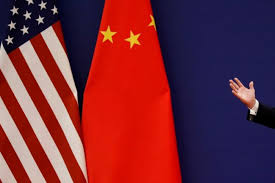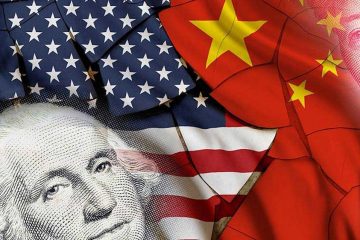Market ties between China, U.S. set to deepen regardless of who wins White House

As the world awaited definitive results from the U.S. presidential election, Chinese investors betting on the re-election of Donald Trump sent shares of a Shenzhen-listed air traffic control software firm soaring on Wednesday.
Wisesoft Co Ltd 002253.SZ, whose Chinese name sounds like “Trump’s big win”, saw its shares jump as much as 9.8% after early returns showed few signs of a conclusive Democratic victory in U.S. polls, making the stock a rare clear winner on the day.
Analysts and investors widely expect a win by Trump, who launched a trade war with China that will soon enter its 28th month, to weigh on Chinese shares in the short term.
“With Trump, Chinese companies don’t know where the next hit is coming from and that makes it hard for them to make decisions about allocating capital,” said Will Malcolm, portfolio manager at Aviva Investors.
“With Biden, there would be ‘guardrails’ to the madness, so at least some idea of where the risks are, and companies can make decisions more easily. This would therefore benefit Chinese equities.”
Whatever the result of the election, ties between U.S. and Chinese financial markets are only set to deepen, despite the trans-Pacific trade war and rocky diplomatic relations.
Amid talk of Sino-U.S. financial decoupling, China has accelerated reforming its capital markets, giving foreigners easier access to its stocks and bonds while promoting international use of the yuan.
Overseas investors held Chinese equities worth 2.75 trillion yuan ($409.5 bln) at the end of September, according to the latest data from the People’s Bank of China, up nearly 1 trillion yuan from a year earlier, with the country’s robust economic recovery from the COVID-19 pandemic proving a strong draw.
The blue-chip CSI300 index .CSI300 has gained more than 16% since the end of 2019, compared with a 4.3% gain for the S&P 500 .SPX.
A rising yuan, high yields and inclusion in major global indexes have also fueled interest in Chinese government bonds, pushing total foreign holdings of its interbank market bonds to near 3 trillion yuan.
China’s major stock indexes rose on Wednesday despite the election nail biter, though the onshore yuan CNY=CFXS hit its weakest point since Oct. 13 as Trump’s odds of victory rose.[.SS][CNY/]
WALL STREET FLOCKS
Even in the month before the election, amid widespread uncertainty about its outcome, major Wall Street institutions were intensively engaged with China, defying rising geopolitical risks in search of long-term growth opportunities.
Over three consecutive weekends, senior executives from U.S. firms including BlackRock, Goldman Sachs, Fidelity, Warburg Pincus, Bridgewater and Fidelity International attended – virtually and in person – a string of high-level Chinese financial conferences.
Ben Zhou, Hong Kong-based managing director of Warburg Pincus, said Sino-U.S. tensions have had little impact on the U.S. firm’s China strategy or confidence in China.
“Instead, we hope to seize new opportunities, because under the current circumstances, China’s financial system is more open,” Zhou said.
China this year fully opened its giant financial industry, scrapping foreign ownership limits in futures, brokerage and mutual fund businesses as part of the interim Sino-U.S. trade deal signed in January.
A top-level Sino-U.S. financial roundtable was held on Oct. 16 between Chinese officials and Wall Street banks with the aim of fostering goodwill and enhancing cooperation, two people with direct knowledge of the closed-door event said.
Participants included BlackRock, Vanguard, JPMorgan and Fidelity, the sources said.
BlackRock and Fidelity plan to set up mutual fund units in China, while U.S. investment banks including JPMorgan and Goldman Sachs have bought control of their Chinese brokerage ventures.

